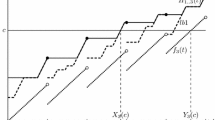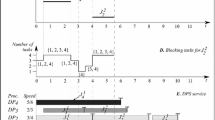Abstract
Earlier approximate response time analysis (RTA) methods for tasks with offsets (transactional task model) exhibit two major deficiencies: (i) They overestimate the calculated response times resulting in an overly pessimistic result. (ii) They suffer from time complexity problems resulting in an RTA method that may not be applicable in practice. This paper shows how these two problems can be alleviated and combined in one single fast-and-tight RTA method that combines the best of worlds, high precision response times and a fast approximate RTA method.
Simulation studies, on randomly generated task sets, show that the response time improvement is significant, typically about 15% tighter response times in 50% of the cases, resulting in about 12% higher admission probability for low priority tasks subjected to admission control. Simulation studies also show that speedups of more than two orders of magnitude, for realistically sized tasks sets, compared to earlier RTA analysis techniques, can be obtained.
Other improvements such as Palencia Gutiérrez, González Harbour (Proceedings of the 20th IEEE real-time systems symposium (RTSS), pp. 328–339, 1999), Redell (Technical Report TRITA-MMK 2003:4, Dept. of Machine Design, KTH, 2003) are orthogonal and complementary which means that our method can easily be incorporated also in those methods. Hence, we conclude that the fast-and-tight RTA method presented is the preferred analysis technique when tight response-time estimates are needed, and that we do not need to sacrifice precision for analysis speed; both are obtained with one single method.
Similar content being viewed by others
References
Audsley NC, Burns A, Tindell K, Richardson MF, Wellings AJ (1993) Applying new scheduling theory to static priority pre-emptive scheduling. Softw Eng J 8(5):284–292
Audsley NC, Burns A, Davis RI, Tindell K, Wellings AJ (1995) Fixed priority pre-emptive scheduling: an historical perspective. Real-Time Syst 8(2–3):173–198
Fersman E (2003) A generic approach to schedulability analysis of real-time systems. PhD thesis, Uppsala University
Joseph M, Pandya P (1986) Finding response times in a real-time system. Comput J 29(5):390–395
Liu C, Layland J (1973) Scheduling algorithms for multiprogramming in a hard-real-time environment. J ACM 20(1):46–61
Mäki-Turja J, Nolin M (2004) Faster response time analysis of tasks with offsets. In: Proceedings of the 10th IEEE real-time technology and applications symposium (RTAS), May 2004
Mäki-Turja J, Hänninen K, Nolin M (2005) Efficient development of real-time systems using hybrid scheduling. In: International conference on embedded systems and applications (ESA), June 2005
Palencia Gutiérrez JC, González Harbour M (1998) Schedulability analysis for tasks with static and dynamic offsets. In: Proceedings of the 19th IEEE real-time systems symposium (RTSS), December 1998
Palencia Gutiérrez JC, González Harbour M (1999) Exploiting precedence relations in the schedulability analysis of distributed real-time systems. In: Proceedings of the 20th IEEE real-time systems symposium (RTSS), December 1999, pp 328–339
Palencia JC, González Harbour M (2003a) Offset-based response time analysis of distributed systems scheduled under EDF. In: Proceedings of the 15th Euromicro conference on teal-time systems, June 2003
Palencia Gutiérrez JC, González Harbour M (2003b) Response time analysis for tasks scheduled under EDF within fixed priorities. In: Proceedings of the 24th IEEE real-time systems symposium (RTSS), December 2003
Pop T, Eles P, Peng Z (2003) Schedulability analysis for distributed heterogeneous time/event triggered real-time systems In: Proceedings of the 15th Euromicro conference on real-time systems, July 2003
Rahni A, Traore K, Grolleau E, Richard M (2007) Comparison of two worst-case response time analysis methods for real-time transactions. In: Junior researchers workshop on real-time computing, March 2007
Redell O (2003) Accounting for precedence constraints in the analysis of tree-shaped transactions in distributed real-time systems. Technical Report TRITA-MMK 2003:4, Dept. of Machine Design, KTH
Regher J, Reid A, Webb K, Parker M, Lepreau J (2003) Evolving real-time systems using hierarchical scheduling and concurrency analysis. In: Proceedings of the 24th IEEE real-time systems symposium (RTSS), December 2003. IEEE Computer Society, Los Alamitos
Sha L, Abdelzaher T, Årzén K-E, Cervin A, Baker TP, Burns A, Buttazzo G, Caccamo M, Lehoczky JP, Mok AK (2004) Real time scheduling theory: a historical perspective. Real-Time Syst 28(2/3):101–155
Sjödin M, Hansson H (1998) Improved response-time calculations. In: Proceedings of the 19th IEEE real-time systems symposium (RTSS), December 1998. http://www.docs.uu.se/~mic/papers.html
Tindell K (1992) Using offset information to analyse static priority pre-emptively scheduled task sets. Technical Report YCS-182, Dept. of Computer Science, University of York, England
Author information
Authors and Affiliations
Corresponding author
Rights and permissions
About this article
Cite this article
Mäki-Turja, J., Nolin, M. Efficient implementation of tight response-times for tasks with offsets. Real-Time Syst 40, 77–116 (2008). https://doi.org/10.1007/s11241-008-9050-9
Published:
Issue Date:
DOI: https://doi.org/10.1007/s11241-008-9050-9




